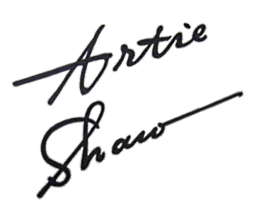A Timeline of Artie Shaw’s Life
- May 23, 1910: Arthur Arshawsky (Artie Shaw) Born in New York City
- 1923: Began playing alto sax
- 1924: Shaw played with the New Haven High School Band and led a local group, the Bellevue Ramblers
- 1924: Changed his name from ‘Arthur Arshawsky’ to ‘Art Shaw’ to become a professional musician
- 1925: Shaw spent part of 1925 with Johnny Cavallaro’s dance band
- 1925-1936: Session musician with many bands and orchestras
- 1926: Began playing clarinet
- 1926-1929: Orchestra director and arranger in Cleveland, Ohio
- 1927: For the first time Artie hears Louis Armstrong’s recordings of Savoy Blues and West End Blues with his Hot Five
- 1927: Artie took a trip up to Chicago’s Savoy Ballroom to hear trumpeter Louis Armstrong play in person
- 1928: Artie won an essay contest that brought him to Hollywood
- 1929-1930: Made his recording debut with a show and comedy dance band, Irving Aaronson’s Commanders
- 1932: Joined the Roger Wolfe Kahn Orchestra
- 1932-1933: Married Jane Cairns
- 1934-1937: Married Margaret Allen
- 1935: Gained attention with his “Interlude in B-flat” at a swing concert at the Imperial Theater in New York.
- 1935-1938: Popular hits played by Artie’s swing bands included “Begin the Beguine” , “Stardust”, “Back Bay Shuffle”, “Moonglow”, “Rosalie” and “Frenesi”
- 1937-1938: Band was known as ‘Art Shaw and His New Music’
- 1938: Forms new band known as ‘Artie Shaw and His Orchestra’
- 1938: Signed Billie Holiday as his band’s vocalist
- 1938: DownBeat magazine readers dethrone Benny Goodman and voted Artie Shaw as the ‘King of Swing’
- 1938: Remote radio broadcasts from the Blue Room of the Hotel Lincoln in New York City
- 1938-1939: Broadcast on CBS Radio
- 1939: House band at the Café Rouge of the Hotel Pennsylvania in New York
- 1939: Shaw made several musical short films in 1939 for Vitaphone and Paramount Pictures
- 1939: In movie ‘Dancing Co-Ed’ with Lana Turner
- 1939-1940: World’s Fair NYC
- 1940: Artie portrayed himself in the Fred Astaire film ‘Second Chorus’, Oscar nomination for Best Musical
- 1940: Married actress Lana Turner in February
- 1940: Returned to US from a 2-month retreat to Mexico
- 1940: Formed new jazz band in Hollywood resulting in the hit ‘Frenesi’
- 1940: Hired as bandleader for the Burns and Allen Show radio broadcast from Hollywood
- 1940: ‘Love of My Life’ receives Oscar Nomination for Best Original Song and Best Score
- 1940-1941: Formed new band ‘Artie Shaw and the Gramercy Five’
- 1941: Formed a big band with seven brass, five saxes, four rhythm, and fifteen strings.
- December 7, 1941: While performing a concert in Providence Rhode Island, Artie was handed a note about the Pearl Harbor bombing.
- 1942: Joined the US Navy, served in the Pacific, formed a band that played for Navy personnel
- 1942-1943: Married Betty Kern, daughter of Jerome Kern
- 1944: Discharged from Navy in February
- 1944: Formed new band in Hollywood with eight brass, five saxes, and no strings, recording for RCA Victor
- 1945: Signed with independent label Musicraft after RCA Victor contract expired
- 1945-1946: Married actress Ava Gardner
- 1946-1948: Married author Kathleen Winsor
- 1946: Shaw featured young singer Mel Torme on Musicraft recordings.
- 1947: Artie plays Carnegie Hall, performing Mozart’s Clarinet Concerto with the New York Philharmonic Orchestra
- 1949: CBS Television show ‘Adventures in Jazz’
- 1950: A mystery guest on the TV panel game show ‘What’s My Line?’
- 1952: Published autobiography, The Trouble With Cinderella: An Outline of Identity
- 1952-1956: Married actress Doris Dowling
- 1952: Television appearance on ‘The Jackie Gleason Show’
- 1953: Son Jonathan D. Shaw born in July
- 1953: First television broadcasts in color.
- 1953: Artie was required to testify before the House Un-American Activities Committee for his leftist activities.
- 1954: Toured Australia with Buddy Rich and Ella Fitzgerald
- 1954: Retired from the Music Industry
- 1954-1960?: Lived in Europe, mostly in Spain
- 1956: Television appearance on CBS celebrity panel show ‘To Tell the Truth’
- 1957-1985: Married actress Evelyn Keyes
- 1958: Son Steven Kern born
- 1962: Artie ranked 4th in US for expert marksmanship
- 1962: Appearance on NBC television gameshow ‘Your First Impression’
- 1962: Appearance on NBC television talk show ‘The Merv Griffin Show’
- 1962: Appearance on ‘The Tonight Show: Starring Johnny Carson’
- 1962: Artie Shaw awarded eight gold record plaques at a special luncheon held by RCA Victor in 1962, for 43 million records sold.
- 1965: Published his second book, ‘I Love You, I Hate You, Drop Dead!’
- 1970’s: Artie made a number of appearances on The Mike Douglas Show and The Tonight Show with Johnny Carson.
- 1976: Artie’s 1940 recording of “Stardust” was used in its entirety in the closing credits of the film ‘The Man Who Fell to Earth’, starring David Bowie.
- 1980: Artie donated his music library of over 700 scores and parts and approximately 1,000 pieces of sheet music, to Boston University
- 1983: Formed a new band and selected clarinetist Dick Johnson as bandleader and soloist.
- 1985: Brigitte Berman, a Canadian filmmaker, created an Academy Award-winning documentary of Artie Shaw’s life titled ‘Artie Shaw: Time Is All You’ve Got’
- 1986: Included in PBS television series ‘American Masters’
- 1989: The Complete Gramercy 5 Sessions released
- 1991: Artie Shaw’s donated music collection was transferred to the School of Music of the University of Arizona in Tucson
- 2000: Inducted to the Grammy Hall of Fame
- 2001: PBS television documentary mini-series ‘Jazz’
- 2003: Awarded ‘Grammy Lifetime Achievement Award’
- 2004: Martin Scorcese used Artie’s song ‘Nightmare’ in his Academy Award-winning Howard Hughes biopic, ‘The Aviator’
- December 30, 2004: Artie Shaw Died in Thousand Oaks, California
